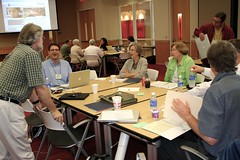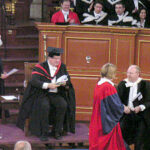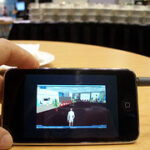
- Image by cogdogblog via Flickr
Session 1: Symposium: Personal Learning Environments – What Works for Librarians
Lots of exploration of professional PLEs – variations from minimal to those expanding beyond “healthy boundaries”
http://docs.google.com/Present?docid=ddkkfncs_329f3x3g2f4&skipauth=true
Symposium: ePortfolio strategies for the tertiary sector
Policy level approaches to uptake…
mobility, lifelong ed&training – RPL is a key concern – ePortfolio strategies might address some of this…
Institutional considerations – Eportfolio for academic staff deveopment – impacts HR, IT, etc.. integration – service provision…
PERSONAL – doesn’t seem to be mentioned…
Embedding ePortfolio in the curriculum – pedagogical drivers…
Dry, dry, dry examples seem predicated on delivery models of pedagogy rather than student-centred, constructivist approaches… reflective stuff seems to be tacked on – we in the arts have integrated reflection for decades…
Use of ePorfolios to drive pedagogical change in institutions…
Session 2: Beyond the here and now: Professional Staff ePortfolio for sustainability, growth, and professional development (Kim Hauville Queensland University of Technology, QLD Wendy Harper Queensland University of Technology, QLD )
assisting professional development and progression
“life wide” aspects of eportfolio
Matrix across various contexts
mapping to insitutional needs and staff capability directions.
performance planning and management
voluntary use..
Aropä and PeerWise: Supporting Student Contributed Pedagogy in Large Classes John Hamer University of Auckland, NEW ZEALAND
Basic differentiation on constructivist and critical pedagogies as rationale for shift into technological modalities.
interesting proposition that “teacher as authority undermines deep learning”
Increased time “on-task” – better learning outcomes..
Peer assessment strategies – http://peerwise.cs.auckland.ac.nz/
Apps developed by the university??
Self-sustaining…. lecturers release it to students and they maintain the development of the resources.
Hi level voluntary use of he system… some data to show improved exam results…
Utilizing Visual and Auditory Tools to Engage the 21st Century eLearner
Kathleen Bacer Azusa Pacific University, USA
engagement – if not engaged fully attention will shift…
no lectures, no tests… all driven by student’s doing it…
a range of tools… voicethread, etc… skype….
Session 3: Learning 2.0: Teachers who Choose to be Left Behind Eva Dobozy Edith Cowan University, WA
More on constructivist and critical pedagogy…
Why learning about emerging technologies is part of every librarian’s job Kathryn Greenhill Murdoch University, WA
As a parent, before being a teacher/librarian – a need to be able to understand emerging technologies
disruptive change has already occurred… for (teachers as well as) librarians
data is in the cloud – not necessarily in the library!
balance of power shifts between library and user….
in the past – knowledge/information was scarce- the book was the object… now the data flows freely…
Kathryn argues that librarians have a role AND many of the necessary skills to be relevant in the new technological contexts
23 things project – http://plcmcl2-things.blogspot.com/
PLENARY: Keynote – ICT as the basis for innovation–The Dutch approach Dr Leo Plugge Executive Secretary, Scientific Technical Council, SURF
This was a very BIG presentation – so much to consider about the scale of the undertaking. As “moodler” twittered – “ #edaust09 I wish this same presentation was being given by someone from the AU government (swapping NL references for AU).“
Related articles by Zemanta
- Online Professional Development Center Launched (blogs.adobe.com)
- Create the Future: 21st Century Learning in Practice (123elearning.blogspot.com)
- SICTASSY – Learning Symposium #1 (deangroom.wordpress.com)
- European First-Year Experience conference 2009 (academic-practice.blogspot.com)
- NRC PLE Project Job Opportunities (downes.ca)
![Reblog this post [with Zemanta]](http://img.zemanta.com/reblog_a.png?x-id=cec59216-d573-8815-8c14-61befac89a70)





